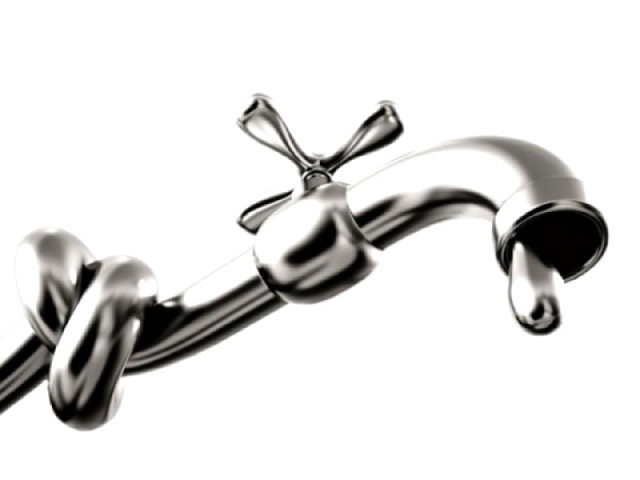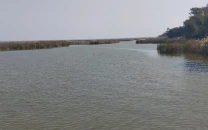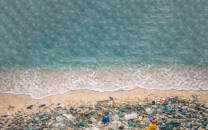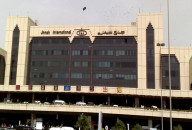No resolution in sight for Hyderabad's contaminated water issue
Implementation of judicial commission's directives not likely to materialise due to WASA's financial constraints

Kotri Barrage is the last barrage on River Indus in Sindh before the river ends in the Arabian Sea. Its four canals are an irrigation and drinking water source for Karachi, Hyderabad, Jamshoro, Thatta, Tando Muhammad Khan and Badin districts. PHOTO: FILE
The agency's critics allege that incompetence and corruption are also responsible for this permanent crisis, which, besides creating water supply and drainage woes, also recurrently deprives its employees of timely salaries and pensions.
Even the orders of Sindh High Court's judicial commission on water and sanitation to Wasa for providing clean drinking water appear far from implementation. The single-judge commission headed by Justice Mohammad Iqbal Kalhoro conducted its first hearing and visits to sites in Hyderabad on January 19. The most recent hearing took place on April 15.
Potable water and sanitation: Judicial commission finds fault with reports
"We have submitted a summary for a Rs2.23-billion financial grant to the Sindh government," Wasa Managing Director Masood Jumani told The Express Tribune. With this amount, the agency aims at rehabilitating its five filtration plants, which supply 60 to 70 million gallons of water per day, along with overhauling the water supply system.
Although the request for the grant was submitted to ensure compliance with the commission's order, there is little hope that the provincial government will release an amount considered enough to kick off the rehabilitation. "We expect to get a Rs50-million grant in aid [from the Sindh government]," Jumani estimated, admitting that the paltry sum is too insignificant to allow any improvement beyond the most necessary process of chlorination.
However, that too will be done only in one of the five filtration plants in Hyderabad - the 30MGD New Filtration Plant on Jamshoro Road. "The judicial commission has given us May 15 [as the] deadline for completing the chlorination process there," he said.
But chlorination is just one component of the filtration process. The 30MGD plant's clarifiers, sludge pumps and lagoons, besides other components, also require rehabilitation and improvement.
Judicial commission submits report after six-week-long fact-finding mission
"It is one part of the whole filtration process … unless the whole procedure of filtration is not applied, quality of water cannot be improved," the commission observed in its April 15 order.
According to Jumani, this plant supplies water to around half the city. The remaining parts of Hyderabad are supplied water from the Hala Naka, Paretabad, Latifabad and LSR filtration plants. Jumani, who also holds the acting charge of director-general of the Hyderabad Development Authority, Wasa's parent organisation, acknowledged that all these plants are providing raw water to consumers.
"The system was destroyed several years ago. The plants and pumping stations need complete rehabilitation to be able to filter water. And this is not possible without massive injection of funds," he explained.
The Latifabad and LSR plants pump water from the downstream of the Kotri Barrage and Hala Naka and Paretabad from the Akram Canal. However, both the barrage's downstream and canal are currently flowing at extremely low levels, with increased concentration of microbes.
Hyderabad commissioner to submit report on water quality
"High concentration of microbes like E-coli, which are harmful for human health, is very likely [in the unfiltered water being supplied by these four plants]," said Prof Altaf Siyal of Mehran University of Engineering and Technology's US-Pakistan Centre for Advanced Studies in Water. But he ruled out presence of heavy metals or high turbidity at the locations from where the water is lifted by the four plants.
Complaints about dirty and smelly water by residents of parts of Latifabad and City talukas began as soon as the flows in the Indus River and its off-taking canals decreased.
On April 22, the judicial commission passed another order, asking Wasa and the Hyderabad commissioner to rehabilitate the four plants. They were also ordered to construct boundary walls around more than a dozen lagoons of the five plants and submit a compliance report on May 6.
The MD, however, said Wasa will express its inability before the commission to implement the order due to the funds constraints.



















COMMENTS
Comments are moderated and generally will be posted if they are on-topic and not abusive.
For more information, please see our Comments FAQ